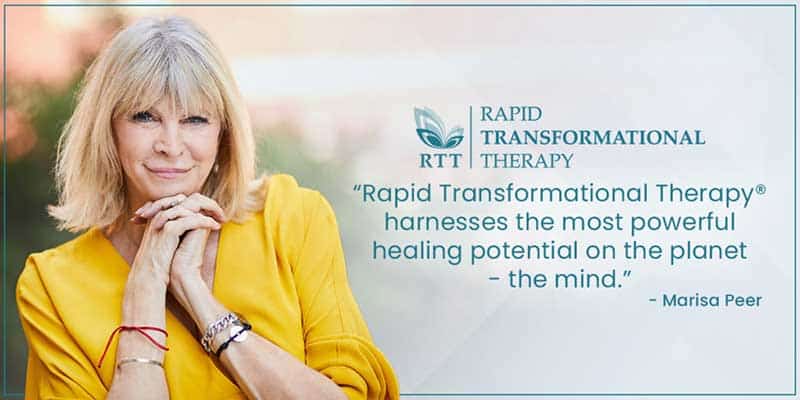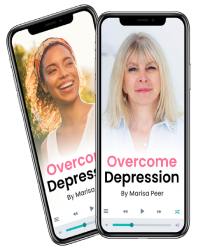Emotional pain is the kind of pain that does not come from physical injury. Metaphorically speaking, it is caused by your soul being wounded. It might be a recent trauma that you survived and overcame—but the pain stayed with you. It could also be a long-forgotten insult, rejection, or disappointment, that made you susceptible to feeling this way.
Whichever the cause, emotional pain is an unpleasant companion. It may affect your physical health, put a strain on your relationships, and jeopardize your education and career. Naturally, you want to break free. If you have had enough and want to end the torment, we will show you how.
In this article, you will learn:
- How emotional pain can influence your life
- What causes emotional pain
- How to cope with emotional pain
- How to break free from emotional pain once and for all
What Is Emotional Pain?
Emotional (mental or psychological) pain is a type of pain that occurs when our basic human needs—to be loved, safe, and acknowledged, are hurt.
There are plenty of opportunities for this to happen. Your parents might have been very cold and distant. A divorce might have robbed you of the feeling of emotional safety. You were harshly rejected when you applied for a dream job.
As a result, you feel broken, intensely hurting, and your mind is shouting: “I don’t want to feel this way!”
When you are emotionally hurting, your thoughts keep coming back to how you were wounded and you see no solution to your anguish. It often feels as if your whole life, your mind, body, and actions are being held captive. It is an overwhelming and extremely unpleasant experience.
Emotional pain can be as excruciating as a physical ache. The reason for it might be that emotional and physical pain share the same neural basis. In other words, psychological distress is, in many ways, equal to bodily aches. You can often feel it in the body expressed as tension in the neck, throat, shoulders, chest, and stomach.
The two types of emotional pain

There are two types of emotional pain—acute and chronic.
When your loved one passes away, you lose a possession or status, or experience a trauma of any sort, these events might cause acute emotional pain.
The solid ground under your feet gets swept away. You feel low on energy and preoccupied with the loss. It might not feel good to socialize for some time. You might even blame yourself and be very self-critical.
All of those emotions are normal. Grieving is a natural process that should run its course. It is meant to help us incorporate the void left behind by the loss into our new reality. However, bereavement can also turn into chronic, unhealthy emotional pain and depression.
The pain can become ingrained into your subconsciousness and transform into chronic psychological pain. It becomes somewhat of a sinister companion that has no apparent cause. By hiding in your subconsciousness, emotional pain orchestrates your actions without you realizing it.
You start looking at the world through the lenses of psychological pain. Instead of feeling empowered and confident, chronic emotional pain makes you expect to be hurt.
However, there is a way out. Even more so, it is possible to do it quickly and permanently. What you need is to rewire your mind with the help of a person who speaks the language of your subconsciousness—someone like Marisa Peer.
Marisa is an award-winning therapist, world-renowned speaker, author, and founder of Rapid Transformational Therapy® (RTT®). She designed RTT® to be a revolutionary method that combines neuroscience, psychotherapy, hypnotherapy, Neuro-Linguistic Programming, and Cognitive Behavioral Therapy.
Later in the article, we will show you how to set yourself free from the anguish with the help of Marisa and her method.
How Emotional Pain Can Influence Your Life

If you do not address your pain the right way, it might cause physical illness and destabilize your life in many different areas.
How emotional pain affects your body
Your thoughts, emotions, and body are all interconnected.
We experience the feeling of emotional pain both in our minds and our bodies. Your mind reacts by overthinking or producing anxious thoughts. Your body reacts with headaches, diarrhea, muscle pain and tension, dizziness, nausea, or gastrointestinal upset.
Intense grief and suffering can be expressed as a range of symptoms of medical diseases. This can lead to different psychosomatic disorders.
Even though society often disregards emotional pain as a wimp that will pass on its own, it is as real and debilitating as physical pain.
Severe adverse emotions can trigger tension headaches, migraines, psoriasis, eczema, stomach ulcers, high blood pressure, and heart disease—or make them worse.
Broken heart syndrome
Anyone who went through a loss and trauma could vouch that it feels as if your heart is literally breaking.
In 1990, a Japanese scientist confirmed that the feeling of heartbreak is quite accurate. He explained the phenomenon and named it takotsubo cardiomyopathy, also known as a broken heart syndrome.
Broken heart syndrome is in most cases a temporary weakening of the left heart ventricle following an episode of extreme emotions.
Suffering a loss, harsh rejection, abuse, or fierce argument might cause a bodily reaction that is severe enough for your heart to get “broken.”
Emotional pain can destabilize your life
Mental pain can make you start losing your grip on life.
It would be extremely tough to swim during a sea storm. Likewise, when you are in a turmoil of emotional suffering, managing your work and relationships is a challenge.
It wreaks havoc and incapacitates your mental resources to cope with day-to-day living and devours your ability to focus on anything apart from the pain.
Gradually, life becomes gray and your positive emotions flatten. Joy becomes a forgotten feeling.
Emotional pain has a way of never truly leaving your side. Even during good times, it will find a way to sneak in and ruin the moment. Unless you work on resolving it once and for all, it will keep coming back.
When you are in emotional pain, you might start to underperform professionally. Instead of being at the top of your game during the team meeting, your mind would wander off to a rejection you cannot get over.
Emotional pain could also hamper your capacity to connect with your partner and your relationship could begin to decline. You are not able to enjoy your night out as you used to. “Are you even listening to me?!”, could become a sentence you hear daily.
Motivating yourself to go out and achieve goals can also be a struggle when you are hurting emotionally. It might be very difficult to tap into your zest for success when you have recently been crudely rejected as a candidate for your desired university.
Did you not get the job promotion you worked so hard for? It can feel too laborious to try again. All of a sudden, you are in a vicious circle of failing and hurting.
What Causes Emotional Pain?

Psychological pain can be caused by a recent hurtful event or an old wound that never healed.
Recent hurtful event
Emotional pain is what tends to linger after a traumatic event.
If you survived a war, severe loss, rape, robbery, violence or abuse, you probably experienced a myriad of emotions.
The shock was followed by rage and intense protest. You might have felt angry at everyone, and then became overwhelmed with extreme guilt and self-blame. However, once the wave of emotions subsided, what you were left with is emotional pain.
If you experienced loss or trauma, it is recommended to address it with the help of a professional. Otherwise, you might be left with a long-lasting psychological hurt.
Old emotional wounds
To understand the impact of old emotional wounds, you might need to go back to your childhood or adolescence.
When your basic human needs for love, safety, and acknowledgment are not met as a child, later in life you might become easily triggered. Old emotional wounds could make it difficult to control your emotional reactions. Every new insult resurrects those old hurts.
You could have also acquired a range of limiting beliefs that now follow you in your adult life. As children, we are highly susceptible to the messages we receive from our caretakers. They shape our view of ourselves and the world. If you got the impression that the world is a hurtful place, you might be subconsciously wired for emotional pain.
Similarly, as adolescents, we were learning what to expect out of life.
Someone might have cruelly rejected you—a crush or your schoolmates. As a result, you became very sensitive to rejection of any sort. You became vulnerable to emotional pain.
How to Cope with Emotional Pain

Emotional pain is one of the most common reasons people seek psychotherapy. A therapist will help you explore the roots of your suffering. They will give you the tools to fight the pain. There is also a lot you can do on your own to heal from psychologically hurting all the time.
Let it all out—and then close that dam
Acute emotional pain is like a raging river—it is hard to stop it while in full swing. Therefore, allow yourself time to grieve. Take a few days off work and outings. Cry, vent the pain, let all your emotions out.
Do not be afraid of the pain—experience it. Tell and retell the story about your hurt to a trustworthy and supportive friend.
However, after that—close the dam. Acknowledge that it is now time to stop ruminating about it. Stop feeding it and reliving the trauma. What keeps the pain alive is not being able to let go. Clinging to an insult or self-blame is bound to make us feel miserable for a long time.
Pain has a natural healing potential. That is, as long as you do not allow your mind to keep obsessing about what you went through. Know that the pain will still be with you for a little while. However, it will be gradually tempering. Let the healing do its course.
After that, you will be the new you. With lessons learned, you will have a new layer of resilience to shield you from future aches.
Forgive others and yourself
In life, we get hurt by others. We sometimes also end up hurting another. As a result, we will either feel guilty or become resentful. These emotions can be hard to let go of.
When you cling to self-reproach, you are effectively stopping yourself from moving on. Similarly, it may feel good at first to obsess about how someone has done us wrong. Yet, this is the recipe for emotional pain.
Naturally, it may be difficult to look the cause of your pain in the eyes. However, it is the only way out of it. If you hurt someone or caused trouble, use this as an opportunity to grow. Learn from your mistakes, forgive yourself, and move ahead.
In the same way, recognizing that you were offended by someone but forgiving them is a path towards liberation.
Forgiving does not mean saying that something was right if it was not. It does not mean condoning unacceptable behavior. What it does mean is that you have become greater than the insult and regret.
Sometimes, the person who hurt us might not even know what they did. They have long forgotten about it. We are the ones carrying this pain with us for months or years.
We could also start feeling guilty for feeling hurt for so long. Therefore, there is another level of forgiveness to consider. Forgive yourself for being in the wrong place at the wrong time. Forgive yourself for being naive or angry. Finally, forgive yourself that you were carrying this pain for so long and was not courageous enough to open Pandora’s box and deal with it.
How to forgive yourself
How to do it? You could try writing a letter to the person who hurt you. Be honest about your feelings and how this has affected your life. Let it all out. You do not need to send the letter, but it will help you heal to express what you have kept bottled up for so long.
Marisa Peer’s approach can help you with this. Her 20-Minute Guided Forgiveness Meditation will help you free yourself from the burden of resentment and hurt.
Forgive yourself and others and move on to being a free person.
Give yourself plenty of love

When you had the flu as a child, your caregivers would take care of you. They would be gentle and supportive. They made sure you took your medicine and drank your tea. You were allowed to watch cartoons all day and did not have to do any chores.
When you are emotionally hurting as an adult, you need the same sort of care. Only this time, you are the carer. You need to make sure you get everything you need. Get support from the right people. Focus more on your hobbies and things you like. Pamper yourself and take it easy for a while. Let the healing happen in the background.
Acceptance, mindfulness, and gratefulness
When we get hurt, our immediate instinct is to get away from it. We are somewhat afraid of feeling that way. We want to end the pain—without delay. This is the reason why many people go for alcohol, drugs, and other harmful means to numb the pain.
However, pain is a normal part of life. It prompts us to learn and grow. To avoid the pitfalls of addiction and depression, we need to accept the pain. Be mindful of how you feel, recognize emotions and thoughts when they appear. Do not judge them or expect them to change. Merely acknowledge and accept.
Suffering multiplies from resisting a painful situation we experience. Think of it as a formula: Suffering = Pain x Resistance. Accepting what had happened to us or the pain itself will help us decrease our suffering.
To support the process, practice gratitude. No matter what situation you are in, there is always something to be grateful for. Look for at least one thing you are thankful for every day. This will shift your perspective on life. When you are grateful, you recognize that there is goodness out there—not just hurt.
Learn how to change your beliefs
Most of us try to fight our minds by sheer force or willpower. We try to yank ourselves out of emotional pain. However, this will not work. Not in the long run at least. You cannot fight your brain’s wiring. You can, nonetheless, work with your mind, not against it.
Our mind works by a certain set of rules. Marisa Peer has spent decades decyphering those rules for you, so you do not need to.
One such rule is—“First you make your beliefs, then your beliefs make you.” Your mind’s job is to find proof for what you believe in.
If you believe that all men are cheaters, you will find a cheater. And another… and another. If you believe you are a failure, you will keep failing. Amazing as it may be, your mind will find a way to confirm your convictions to you.
Therefore, instead of letting your beliefs dictate your destiny, work your mind. Change those beliefs. Question all the ideas about the life you might have. Then rephrase them into something positive. For example, “I am at the end of my tether” could become “I am a survivor” and with time transform into “I have phenomenal coping skills.”
Repeat the new belief often, at least a few times a day. Your mind will quickly catch up. Almost miraculously, opportunities will reveal themselves. Emotional pain will give place to resilience.
Build your resilience
Yes, pain is a part of life. We all can expect to be hurt a few times during our lifetime. To be better prepared for future life challenges, start building your resilience muscle today.
Which psychological tools can help you handle any emotional aches? Self-esteem is a vital asset in dealing with problems in life. Assertiveness is another one. It will teach you to stand behind your values and respectfully protect your autonomy.
Work on developing healthy coping mechanisms. Build your support network. In short, prepare for future battles and make sure that you grow from your pains.
Resolve the root cause of your emotional pain

Sometimes, no matter how hard you try, it seems you cannot shake off the emotional pain. Why? Many of the causes of such pain are deeply ingrained into our worldviews. Most often we are not aware of why we feel the way we do. We cannot pinpoint what stands behind those emotions. We merely act on a sort of emotional autopilot.
All the previous ways to cope with emotional pain are essential in your psychological toolbox. However, they might not be enough. Especially so when your pain becomes chronic. At that point, you might need outside help. The best help you can get is from Marisa Peer and RTT® trained therapists.
Rapid Transformational Therapy® is a technique that opens the door to your subconsciousness and reprograms your mind permanently in just a few sessions. RTT® recognizes and values the significance that you attach to your problems.
With an RTT® therapist on your side, you will explore the meaning and interpretation of events that caused your pain. Then together, you will work to change them.
When you cannot prevail over the emotional pain, there is usually the root cause hiding in your subconsciousness. RTT® draws out “unfinished business.” It is a technique for addressing the trauma that you have been holding onto for many years.
An RTT® specialist therapist knows how to find and mend your subconscious erroneous beliefs. They will awaken the healing potential that lies within you.
Break Free from Emotional Pain
Yes, being hurt is a part of life. Yes, pain is normal. However, it doesn’t need to go on forever. If you feel that the time has come to break free, book a call to connect with one of the RTT® specialist therapists who are trained in helping to resolve emotional pain. Become the strong and happy person you were meant to be.
You can also consider accessing Marisa Peer’s Free Yourself From Depression self-hypnosis audio, which helps you challenge your way of thinking and rewire your mind to welcome in peace and calm, to help you fight away any emotional pain you might be experiencing.
Do away with emotional pain with the help of RTT® right now – for good!



